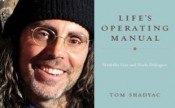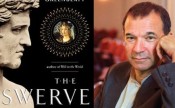Free Forum Q&A – TOM SHADYAC, director of documentary: I AM ; author of LIFE’S OPERATING MANUAL
Written on July 4th, 2014 |
Aired: 07/28/13
I sometimes say that in a past life I worked in the entertainment industry, comedy in particular. I co-wrote and co-produced novelty records THE HOMECOMING QUEEN’S GOT A GUN, I LIKE EM BIG AND STUPID and EARTH GIRLS ARE EASY all performed by Julie Brown. I directed comic music videos for some of these songs, and ended up co-writing and co-producing the film EARTH GIRLS ARE EASY. I’ve produced and hosted this show since 1996 and I consult and speak primarily to non-profits and foundations, working with them on communications, encouraging them to tell better stories.
My transition seems mild compared with that of this week’s guest, TOM SHADYAC, whose phenomenally successful writing/directing/producing career included the hits- ACE VENTURA: PET DETECTIVE, LIAR LIAR, THE NUTTY PROFESSOR, BRUCE ALMIGHTY, and PATCH ADAMS . His films grossed nearly $2 billion and earned him four People’s Choice awards and a ton of money.
His 2011 documentary, I AM recounts what happened after a cycling accident left him incapacitated for months. Though he ultimately recovered, he emerged a changed man. In the film, Shadyac meets with a variety of thinkers and doers including David Suzuki, Noam Chomsky, Howard Zinn, and Archbishop Desmond Tutu – asking what’s wrong with society and what can we do make things better?
Tom’s now written a book, LIFE’S OPERATING MANUAL, which asks whether life comes with a set of guidelines? If so, what are they? And finally, do we have the courage to pay attention and to change? Rather than spoil the plot by telling you his answers, join us for the conversation.
Q&A: STEPHEN GREENBLATT, National Book Award Winner, THE SWERVE: How the World Became Modern
Written on January 21st, 2012 |
Aired 01/15/12
In the winter of 1417, a short, genial, cannily alert man in his late thirties plucked a very old manuscript off a library shelf, saw with excitement what he had discovered, and ordered that it be copied. The man was Poggio Braccionlini, the greatest book hunter of the Renaissance. His discovery was the last surviving manuscript of an ancient Roman philosophical epic, On the Nature of Things by Lucretius—a beautiful poem of the most dangerous ideas: that the universe functioned without the aid of gods, that religious fear was damaging to human life, and that matter was made up of very small particles in eternal motion, colliding and swerving in new directions.
The copying and translation of this ancient book fueled the Renaissance, inspiring artists such as Botticelli and thinkers such as Giordano Bruno; shaped the thought of Galileo and Freud, Darwin and Einstein; and had a revolutionary influence on writers such as Montaigne and Shakespeare and even Thomas Jefferson.
Stephen Greenblatt is John Cogan University Professor of the Humanities at Harvard University. Among his books are Will of the World: How Shakespeare Became Shakespeare, a Finalist for the 2004 National Book Award in Nonfiction and a New York Times best seller, and Hamlet in Purgatory. He holds honorary degrees from Queen Mary College of the University of London and the University of Bucharest.
